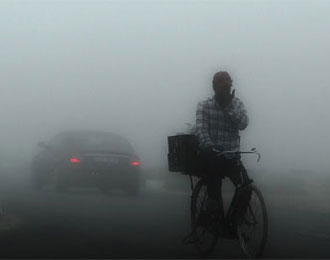
Winter sees spurt in asthma symptoms in UAE
Dubai — As the Middle East witnesses one of its worst winter storms in decades this month asthma sufferers throughout the UAE may find themselves reaching for their inhalers more often than usual.
Tips for asthmatics
The variation in the temperature can be difficult for some asthmatics. The summer months can have their own set of asthma triggers and this will change during the winter months.
> Make sure youdiscuss your asthma triggers with your asthma doctor.
> Discuss the“asthma action plan” with your doctor and take your asthma medications particularly the preventer inhalers regularly. * Make sure you take precautions to avoid or minimise contact with allergens and triggers to your asthma. This will allow asthmatics to enjoy the cooler Middle East weather without thinking about an asthma attack.
As if airborne dust from the continued construction works and sandstorms in the country aren’t triggers enough for those suffering from the condition the recent cold weather spurt is almost guaranteed to worsen symptoms.
A chronic condition which affects the lungs asthma is widespread in the UAE with the World Asthma Foundation estimates suggesting that one in five children in the country suffer from the disease.
A condition which causes breathing problems including coughing wheezing breathlessness and a feeling of tightness in the chest a recurrent disease like asthma can largely reduces one’s quality of life.
While asthma is chronic and cannot be cured appropriate management of the disease can see those living with the condition continue to enjoy a good quality of life Pulmonolgist Dr Asif Sattar tells Khaleej Times.
As the weather cools down Dr Sattar advises sufferers in the UAE to be careful when venturing outdoors taking precautionary measures to reduce the risk of an attack. “Asthmatics need to be extra cautious and should not miss taking their asthma medications particularly their preventer inhaler during the winter period.”
And extra vigilance can go a long way he says advising asthmatics to avoid cold air when possible. “Wear warm clothing too and if needed cover the face with a scarf over the mouth and nose.”
With viral infections tending to be more common during winter he says asthmatics in particular should take the influenza vaccine. “I also tell patients who like to exercise to try exercise indoors ... when it’s cold outside.”
A Pulmonologist Consultant at Mediclinic City Hospital in Dubai Dr Sattar says consulting a doctor to map out an action plan is advisable during the winter months. “It’s also a good idea to ask your asthma doctor to discuss the asthma action plan so you can be aware of your asthma control and alter your asthma medications if needed.”
Triggers
According to the World Health Organisation 235 million people worldwide suffer from asthma and it is the most common chronic disease among children.
The main triggers to asthma in the Middle East are allergens particularly house dust mites and mould.
Both these allergens tend to accumulate when the indoor air circulation is poor and when humidity increases Dr Sattar says. “We also tend to see more asthma exacerbations during dusty days and cooler weather as cold air in itself is a trigger for asthma. Indoor pets are also an important and usually forgotten trigger to asthma.”
Other triggers include strenuous physical exercise; adverse weather conditions like freezing temperatures high humidity and dust storms; and some foods and food additives.
“Strong emotional states either positive or negative can lead to hyperventilation and an asthma episode. And outdoor air pollution caused by industrial emissions and automobile exhaust also can cause an asthma episode.”
A recent report also noted that in large cities that have air pollution problems the number of emergency department visits for asthma episodes goes up during ozone action days when the air quality is especially poor so sufferers in Dubai need to be extra vigilant Dr Sattar says.
kellykhaleejtimes.com

Legal Disclaimer:
MENAFN provides the
information “as is” without warranty of any kind. We do not accept
any responsibility or liability for the accuracy, content, images,
videos, licenses, completeness, legality, or reliability of the information
contained in this article. If you have any complaints or copyright
issues related to this article, kindly contact the provider above.


















Comments
No comment